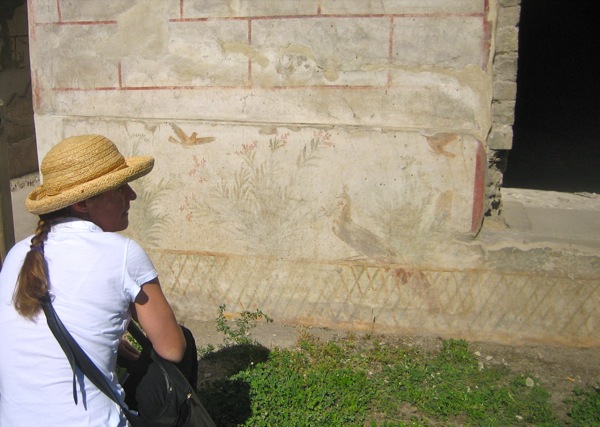
Prestigious lectureship
UD's Giesecke named Jashemski Lecturer by Archaeological Institute of America
2:03 p.m., Oct. 14, 2013--While studying ancient Roman and Greek houses, the University of Delaware’s Annette Giesecke noticed a difference in the way the two cultures maintained gardens. These findings sparked Giesecke to unearth the cultural clues buried in the remains of these gardens.
Giesecke, professor of ancient Greek and Roman studies, has conducted extensive research on the “meaning” of gardens and has been honored for her work by being named as the Archaeological Institute of America’s (AIA) Jashemski Lecturer for 2013-14.
Honors Stories
National Medal of Science
Warren Award
During her prestigious lectureship, Giesecke will deliver lectures at the University of Oklahoma on Wednesday, Oct. 23, Stanford University on Saturday, Oct. 25, and the Minneapolis Institute of Arts on Saturday, March 1. Giesecke’s lectures, titled “Roman Green: Ancient Gardens and the Green Ideal” and “Roman Paradise: Pompeian Gardens and the Green Ideal,” will address ancient Rome’s green movement.
This honor establishes Giesecke — and the University of Delaware — as a leader in the arena of environment humanities and material culture studies.
“It is also a recognition of the fundamental importance of gardens and gardening to human civilization,” said Giesecke. “In fact, gardens are fundamental to human survival and a critical point in current environmental discourse.”
Or, more simply, “Gardens define the nature of our relationship with the place we inhabit.”
In her work, Giesecke explores the deeper contextual meaning of gardens by focusing on both physical remains and artistic and literary representations.
“My research looks at why we garden — and for what purposes we’ve gardened in the past,” she said.
During her research, Giesecke observed the frequent presence of natural forms in Roman artifacts and their typical absence in those of Classical Greece. These findings are representative of how the ancient Greeks separated nature from the home while the ancient Romans embraced nature, bringing it into their residences.
“Gardens are recognized as places of nourishment for the body and soul,” said Giesecke. “They are — and for a very long time have been — places of healing, of self-discovery and self-expression, of political activism and of generating political propaganda, of environmental speculation and preservation efforts.”
Giesecke has authored several books examining the connection between nature and culture including Atoms, Ataraxy and Allusion (2000), The Epic City: Urbanism, Utopia, and the Garden in Ancient Greece and Rome (2007, 2010) and The Mythology of Plants: Botanical Lore from Ancient Greece and Rome (2014).
Additionally, she served as co-editor and contributor to Earth Perfect? Nature, Utopia, and the Garden (2012) and The Good Gardener? Nature, Humanity, and the Garden (2014).
Giesecke organized the “Earth Perfect? Nature, Utopia, and the Garden” interdisciplinary symposium at UD.
About the Jashemski Lectureship
The Jashemski Lectureship is an annual lectureship established by the AIA in honor of Wilhelmina and Stanley Jashemski. Wilhelmina Jashemski, a faculty member at the University of Maryland from 1946-1980, created the first systematic methodology for the excavation and study of the ancient gardens buried by an eruption of Mount Vesuvius. Her pioneering work paved the way for the burgeoning studies of daily or private life in the Roman world.
The AIA has sponsored a lecture program for more than a century. The lectures are free and open to the public and are delivered by leading scholars from North America and abroad presenting a wide range of current archaeological topics throughout the United States and Canada.
Article by Kelley Bregenzer and Kim Morrase








